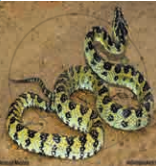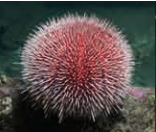Advertisements
Advertisements
Question
Identify the animal given in the picture and write features of its phylum/class.

Solution
The given organism is Snake and it belongs to class Reptilia.
Features of class Reptilia:
- Habitat: They are crawling animals. They are the first true terrestrial vertebrates. Few may be aquatic or semi-aquatic and are also found in marshy areas.
- Locomotion: Locomotion occurs by limbs in most animals. The limbs are pentadactyl with clawed digits, which help the animal to walk, creep or crawl. Snakes are limbless and crawl on their belly.
- Body temperature: They are poikilotherms.
- Exoskeleton: Skin is dry, non-glandular and covered by an exoskeleton of epidermal scales or scutes, shields or plates. Lizards and snake shed their skin periodically.
- Ear: Tympanum is present
- Circulatory system: It has two complete auricles but the ventricles are incompletely partitioned. Therefore, the heart of reptiles is not perfectly four-chambered (except in crocodile the heart is four-chambered).
- Nervous system: The brain is well developed. The olfactory lobes and cerebellum are better developed as compared to amphibians.
- Reproduction: Sexes are separate and exhibit prominent sexual dimorphism. Fertilization is internal and the animals are oviparous (exception - viper, it is viviparous). They show little parental care.
e.g. Naja naja (Cobra), Hemidactylus (Wall lizard), Chelonia (Turtle), Crocodilus (Crocodile), Testudo (Tortoise), Chameleon (Tree lizard), Bangarus (Krait), Vipera (Viper).
APPEARS IN
RELATED QUESTIONS
Answer the following question.
Fish and frog can respire in water. Can they respire through their skin? If yes, why do they have gills?
Answer the following question.
Birds need to keep their body light to help in flying. Hence, they show presence of some organs only on one side. How their skeleton helps in reducing their weight?
Answer the following question.
Cnidarians and Ctenophorans are both diploblastic. Which other character do they have in common, which is not found in other phyla?
Answer the following question.
Fish and snake both have scales. How do these scales differ from each other?
Draw a neat labelled diagram.
Sycon
Draw a neat labelled diagram.
Aurelia
Draw a neat labelled diagram.
Amphioxus
Match the following.
| Phylum | Characters |
| i. Annelida | a. Tube feet |
| ii. Mollusca | b. Ostia |
| iii. Ctenophora | c. Radula |
| iv. Porifera | d. Parapodia |
| v. Echinodermata | e. Comb plates |
Identify the animal given in the picture and write features of its phylum/class.

Identify the animal given in the picture and write features of its phylum/class.

